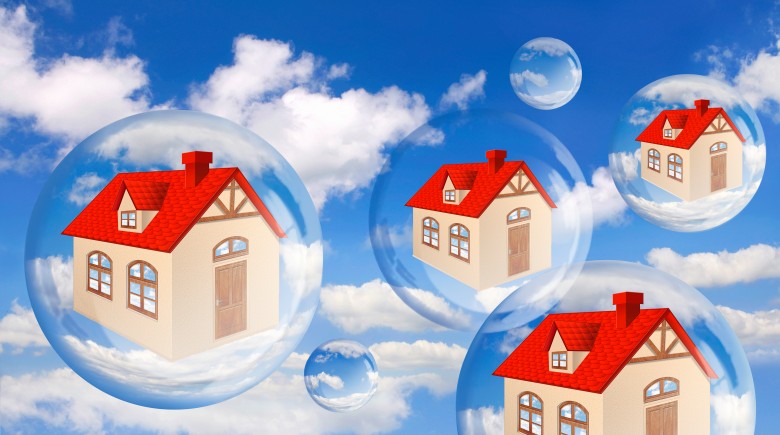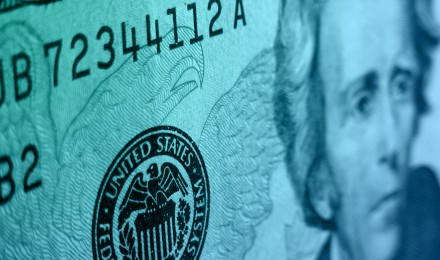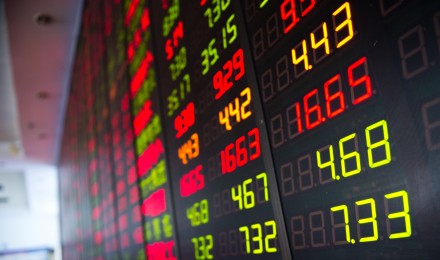It’s always difficult to call a bubble. Or more accurately, to call the apex of the bubble. Sure, everyone and their chihuahua knew that the internet bubble of the late 90’s and early 2000 couldn’t last, but at its peak, the money flow into internet stocks was massive. And in the latest case of housing there is the added twist of analyzing a second bubble. And the first housing bubble just burst in spectacular fashion a mere 5 years ago. So, what is going on now? Is this just a normal, relatively slow, recovery of the housing market that reflects a somewhat abnormal and slow economic recovery?
Unfortunately, this one may be hard to crack as there seems to be more fog associated with this market than is typical. Naturally, CNBC has lots of analysts on that benefit from a housing boom, so it’s a bit difficult to draw too many conclusions. And there appears to be too many analysts that are married to the idea that Bernanke’s quantitative easing program (QE) is the most awesomely awesome idea to hit since Einstein’s theory of relativity. To many of them, stocks are going up because of QE and therefore housing is in a natural rise as well. Now, to be fair, CNBC does have some QE skeptics on its programming and they naturally, aren’t as sanguine about stocks or housing. On the news networks, it always seems that the view of the analysts reflect their view on Barack Obama. On MSNBC, there seems to be a perpetual, bordering on desperate, thirst for “green shoots” in the economy. Every positive, or more accurately lees than horrific, statistic is usually followed by an analyst assuring us that the recovery is “for real” or “undeniable”. CNN isn’t far behind its self proclaimed progressive sister. Fox, naturally, is just the opposite. No piece of economic news seems to emerge that would qualify as a “green shoot” of any sort. And their analysts seem inclined to bring up the “bubble” word at the drop of a hat.
Of course, there is a middle ground that no one seems to have an interest in and that is simply that it is a little of both. After a bubble reaches its nadir there is quite often a big move up (see the stock market in the 1930’s for example) and there is almost certainly some of that going on here. Yes, the low interest rates have definitely helped to stabilize housing, but that doesn’t mean that the huge decline in housing prices didn’t overshoot to the downside after its bubble burst. But also, yes the QE program does seem extreme and almost by the definition of the Bernanake program, these rates are artificially low. Some exuberance in this market seems to be overheated (or at least on the edge of doing so). And who among the investing public hasn’t heard about, read about or seen on TV, the stories of the “house-flippers” back in full force? That is a touch on the anecdotal side, of course, but it is also believable.
Housing is a different market than most bubbles (like say the infamous tulip bubble) in that people, you know, actually use the end product. However, it is also a little disturbing that housing has recovered so far, so fast, especially when many of the areas where the flippers were the most prominent are once again (semi?) roaring back to life. Doesn’t there just seem to be something in your gut that says this housing recovery is a little off? I do believe in the middle ground theory, in that I think a good chunk of the recovery in housing is a simple bounce back. However, I am concerned about the QE and its ultimate reflection in housing prices. QE must end some day, and make no mistake about it, housing will be hurt when interest rates start to rise. And while a “bubble” may not burst, it sure will feel like it to a lot of people. The QE program is distorting the housing market, but it is also making it extremely hard to analyze the market. There are undoubtedly, intended and unintended consequences associated with such a scheme. A double bubble is not out of the question and if the “good times” last much longer the second bubble might make the first one look pea-sized by comparison.
It’s always difficult to call a bubble. Or more accurately, to call the apex of the bubble. Sure, everyone and their chihuahua knew that the internet bubble of the late 90’s and early 2000 couldn’t last, but at its peak, the money flow into internet stocks was massive. And in the latest case of housing there is the added twist of analyzing a second bubble. And the first housing bubble just burst in spectacular fashion a mere 5 years ago. So, what is going on now? Is this just a normal, relatively slow, recovery of the housing market that reflects a somewhat abnormal and slow economic recovery?
Unfortunately, this one may be hard to crack as there seems to be more fog associated with this market than is typical. Naturally, CNBC has lots of analysts on that benefit from a housing boom, so it’s a bit difficult to draw too many conclusions. And there appears to be too many analysts that are married to the idea that Bernanke’s quantitative easing program (QE) is the most awesomely awesome idea to hit since Einstein’s theory of relativity. To many of them, stocks are going up because of QE and therefore housing is in a natural rise as well. Now, to be fair, CNBC does have some QE skeptics on its programming and they naturally, aren’t as sanguine about stocks or housing. On the news networks, it always seems that the view of the analysts reflect their view on Barack Obama. On MSNBC, there seems to be a perpetual, bordering on desperate, thirst for “green shoots” in the economy. Every positive, or more accurately lees than horrific, statistic is usually followed by an analyst assuring us that the recovery is “for real” or “undeniable”. CNN isn’t far behind its self proclaimed progressive sister. Fox, naturally, is just the opposite. No piece of economic news seems to emerge that would qualify as a “green shoot” of any sort. And their analysts seem inclined to bring up the “bubble” word at the drop of a hat.
Of course, there is a middle ground that no one seems to have an interest in and that is simply that it is a little of both. After a bubble reaches its nadir there is quite often a big move up (see the stock market in the 1930’s for example) and there is almost certainly some of that going on here. Yes, the low interest rates have definitely helped to stabilize housing, but that doesn’t mean that the huge decline in housing prices didn’t overshoot to the downside after its bubble burst. But also, yes the QE program does seem extreme and almost by the definition of the Bernanake program, these rates are artificially low. Some exuberance in this market seems to be overheated (or at least on the edge of doing so). And who among the investing public hasn’t heard about, read about or seen on TV, the stories of the “house-flippers” back in full force? That is a touch on the anecdotal side, of course, but it is also believable.
Housing is a different market than most bubbles (like say the infamous tulip bubble) in that people, you know, actually use the end product. However, it is also a little disturbing that housing has recovered so far, so fast, especially when many of the areas where the flippers were the most prominent are once again (semi?) roaring back to life. Doesn’t there just seem to be something in your gut that says this housing recovery is a little off? I do believe in the middle ground theory, in that I think a good chunk of the recovery in housing is a simple bounce back. However, I am concerned about the QE and its ultimate reflection in housing prices. QE must end some day, and make no mistake about it, housing will be hurt when interest rates start to rise. And while a “bubble” may not burst, it sure will feel like it to a lot of people. The QE program is distorting the housing market, but it is also making it extremely hard to analyze the market. There are undoubtedly, intended and unintended consequences associated with such a scheme. A double bubble is not out of the question and if the “good times” last much longer the second bubble might make the first one look pea-sized by comparison.







